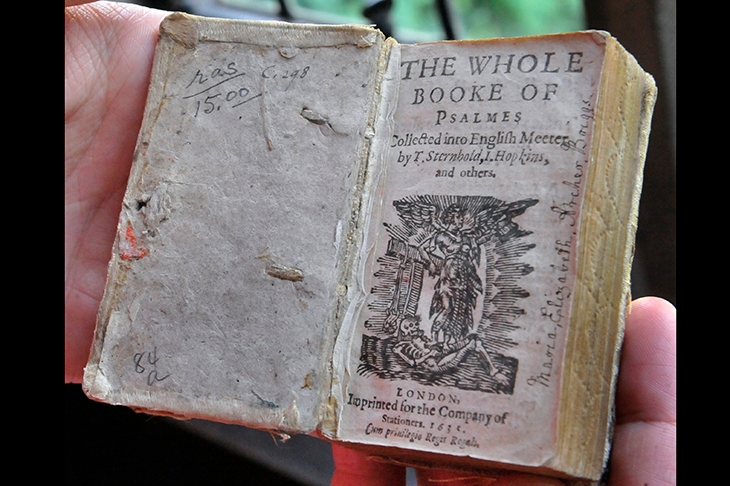As if in defiance of the BBC’s current obsession with programming designed to entice in that elusive young and modish audience, Radio 4 has set us an Easter challenge. Each afternoon over the weekend Jeremy Irons is reading a chunk from The Psalms for half an hour, without illustration (except a bit of music), explication or deviation. It’s a discomfiting listen, at times harsh, unrelenting. The supple but rigorous language of the King James Version of the Bible is both daunting and uplifting. ‘Keep me as the apple of the eye’ is one of my favourite images, and ‘hide me under the shadow of thy wings’ has helped me through many a long night. But there’s so much about the fate of the ‘ungodly’, for whom there is no forgiveness, and for which passages Irons seems to have a particular relish, savouring the archaic phrases, ‘they are enclosed in their own fat’ or ‘Thou hast also given me the necks of mine enemies; that I might destroy them that hate me’.
The word ‘necks’ leapt out from the radio. I wanted Irons to pause so that we could linger on what the poet-psalmist meant. But the words kept tumbling on, and on. It’s so dense, I wonder how many listeners will stick with it. Yet the presence of The Psalms (produced by Sue Roberts) in the schedule suggests that Radio 4 is still in fine fettle, its church broad enough to give us that extraordinary prose delivered at full throttle by Irons. Shorter episodes, though, might have been more encouraging.
A different kind of inspiration was to be found last week in Deborah Bowman’s programme Patient Undone (produced by Beth Eastman), as she talked us through her experience of cancer. As a professor of medical ethics, Bowman is well versed in advocating patient rights, but the very foundations of her professional life were tested when she found herself in a consulting room at the Royal Marsden Hospital listening to her surgeon as he explained that she had cancer in her breast that had already spread into her lymph nodes. She began to realise as a patient how difficult it is in practice to protect the autonomy of the individual, and to respect their wishes.
She met again the surgeon who had given her that life-changing news and wondered how he had prepared himself for such a conversation. How much information should be given to the patient? Bowman would have said tell them everything. Now she is not so sure, having experienced the shock, the fear, the inability at first to make sense of what you’ve been told and to make decisions about what treatment regime you would wish to follow. What should she tell her family? How much danger was her life in?
Autonomy and medical ethics also lay at the heart of last week’s My Name Is Rachel (produced by Emma Rippon), a programme that was also frank, confessional, self-revealing but in an expansive, enhancing way. Rachel Waddingham began seeing monsters in the mirror while still at primary school and later developed schizophrenia, while also being diagnosed with depressive anxiety, psychotic illness, manic depression, dissociative disorder… you name it, she’s been given that diagnosis. She was first hospitalised after her first year at university and has since been in and out of various psychiatric units where she soon discovered that no patient has the right to refuse medication. She told us what it felt like to be grabbed by the (male) nurse who has been assigned to keep watch over you and told, ‘I’m detaining you under Section… of the Mental Health Act.’ On another occasion she was held down forcibly and injected with medication. ‘I felt,’ she said, ‘my autonomy draining out of me.’
We also heard from Dorcas, a mental-health nurse, who told us how she felt when she had to section a patient, how you weigh up the loss of autonomy with the need to protect. Meanwhile in Kent the Open Dialogue scheme focuses on the patient as an individual, spending time with them to understand their lives rather than focusing on their immediate symptoms. It’s intended to cut down on the use of drugs. But the treatment is intense and therefore expensive. Would there be a dividend, though, Rachel wondered, in reducing the number of ‘revolving-door patients’, who seesaw in and out of hospital, off and on medication? Her honesty brought us close to her experience.
Definitively Dusty on Radio 2 (produced by Sue Clark) brought us unusually close to the 1960s diva, taking three hours (in three episodes) to share with us lots of clips of Springfield chatting away as if with friends (‘I wanted to sound buxom’). We also heard enough of her songs to appreciate just how great a singer she was, and also how versatile, moving from country to pop ballads to Motown, jazz and the Pet Shop Boys. Born in 1939, she started her professional musical life in the early 1950s, singing with her brother in the supper clubs of Belgravia and Chelsea to audiences of debutantes and film stars, maybe up to 100 songs a night (for which she was paid a guinea). ‘No one really listened, except Jack Lemmon.’






Comments